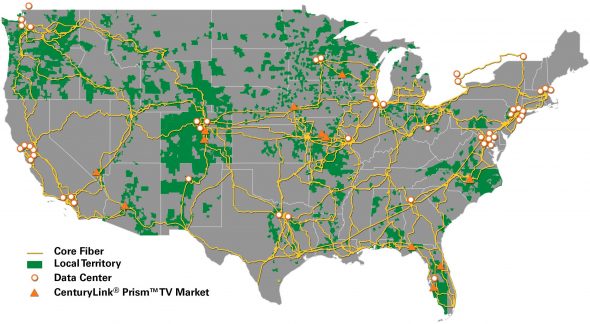 CenturyLink wouldn’t gain much by spinning off its consumer business, argued telecom financial analysts MoffettNathanson in a research note issued today. The cost of a CenturyLink consumer spinoff would leave the company with little in the way of financial benefits, the analysts said.
CenturyLink wouldn’t gain much by spinning off its consumer business, argued telecom financial analysts MoffettNathanson in a research note issued today. The cost of a CenturyLink consumer spinoff would leave the company with little in the way of financial benefits, the analysts said.
CenturyLink said several weeks ago that it was considering strategic options for the consumer portion of the company, including a sale or spinoff of that portion, which comprises about a quarter of total business. The company has become more focused on the enterprise and wholesale side of the telecom market since acquiring Level 3 and some investors believe some of the company’s assets are undervalued, particularly considering that the company’s stock value has declined substantially in recent months. These investors have pushed for a sale or spinoff as a means of unlocking value, MoffettNathanson wrote in its research note.
According to MoffettNathanson, the value of CenturyLink stock declined because of the company’s decision to cut its dividend and because of a decrease in revenue. The analysts argue, however, that the decision to cut the dividend “helped to stabilize the company’s standing with the credit market” and that the revenue decline resulted from several other key decisions not viewed as bad ones – including an exit from the company’s unprofitable or barely profitable Prism video offering.
In other words, maybe CenturyLink’s situation isn’t as dire as the decline in its stock value would suggest.
A CenturyLink Consumer Spinoff?
MoffettNathanson sees interest in spinning off the CenturyLink consumer business driven, in part, by the news that Frontier plans to sell its local service business in four states for a price that equates to between 5.1 and 5.6 times earnings before interest taxes depreciation and amortization (EBITDA). The researchers estimate, however, that about 30% of Frontier’s footprint in the four states is fiber-enabled, compared to only about 10% of CenturyLink’s, suggesting that CenturyLink wouldn’t be able to command the same multiple.

Spinning off the CenturyLink consumer business would generate what the researchers refer to as “dis-synergies” that would result from the difficult task of dividing a network and other operations that serve both the consumer and business sides of the house. These dis-synergies would “simplistically imply roughly $300 million to $600 million in value destruction from separating the businesses,” the researchers argue.
Another concern about a spinoff is whether it would receive necessary approvals from state public utility commissions.
The analysts also question how much upside there is for CenturyLink’s consumer business. They argue, for example, that the company’s opportunity to provide connectivity for small cells is limited because small cells will be deployed only in densely populated areas and CenturyLink is the incumbent local carrier in only two of the nation’s 50 most densely populated cities.
Not all of MoffettNathanson’s analysis of CenturyLink opportunities is so downbeat, however. For example, the researchers see the recent news about FCC plans for a replacement for the Connect America Fund, due to expire in just a couple of years, as a positive, as CenturyLink was one of the largest recipients of CAF funding.
The “potential upside risk is what keeps us on the sidelines,” the researchers wrote.
The upshot is that MoffettNathanson sees CenturyLink’s consumer business remaining within the merged company, where it would be better off anyway.

